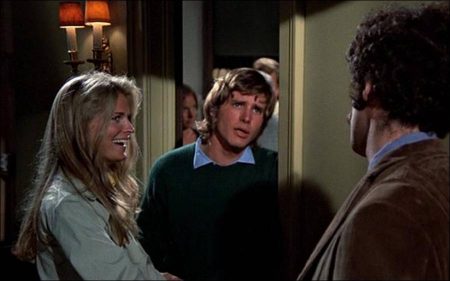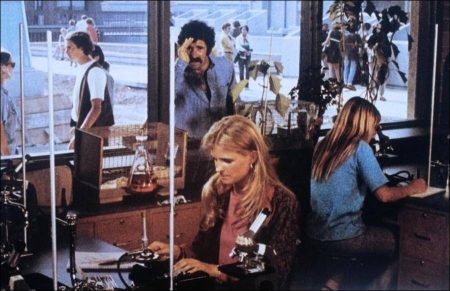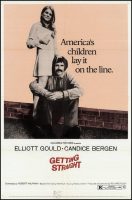Taglines: America’s children lay it on the line.
Getting Straight movie storyline. Harry Bailey has returned from Vietnam and returns to college to earn his masters degree so he can teach English. He is considered a hero among the radical student body, but still sees the absurdity on both sides of the fence. He contends with the reactionary administration and the impetuous, often futile objectives of the restless students. He acts as a mediator between the two feuding bodies. On top of everything else, his girlfriend Jan wants to marry him and live a life in the suburbs. He is cornered and finally lets loose at his own masters degree dissertation meeting, just as the latest protest heats up.
Getting Straight is a 1970 American comedy-drama motion picture directed by Richard Rush, released by Columbia Pictures. The story centered upon student politics at a university in the early 1970s, seen through the eyes of non-conformist graduate student Harry Bailey (Elliott Gould). Also featured in the cast were Candice Bergen as Bailey’s girlfriend, Jeff Corey as Bailey’s professor, Robert F. Lyons as his draft-avoiding friend Nick, and Harrison Ford as a fellow teaching student and his girlfriend’s neighbor.
Getting Straight was released in an era of change and unrest in the United States in the early 1970s, and was in a long line of films that dealt with these themes. Other films of this period with similar themes were Medium Cool (1969), R. P. M. (1970), and The Strawberry Statement (1970).
The film grossed $13.3 million at the domestic box office, earning $5.1 million in US theatrical rentals. It was the 21st highest-grossing film of 1970. The film was one of a number of movies made about campus unrest at this time, others including The Strawberry Statement, The Magic Garden of Stanley Sweetheart, The Pursuit of Happiness, The Revolutionary, Up in the Cellar, Zabriskie Point and RPM. Getting Straight was the only one that was commercially successful.
About the Shooting
Filming started July 7, 1969 in Eugene, Oregon, with Lane Community College standing in for the fictional university. Rush later said Gould “had complete abandon. Elliott did a hell of a job.” He said the actor was “incredibly inventive, tremendously flexible” and that Bergen was “a genuine dedicated, bright human being” who made “an extraordinary breakthrough.”
Candice Bergen said the film took her career in “a new direction… my first experience with democratic, communal movie making.” When filming ended Kaufman wrote “we have sought to record, with a sense of humor, the reality of today’s student protest, campus riots, and establishment reprisals. We will undoubtedly be charged with sensationalism but anything less than a straightforward depiction of these events would be ludicrously false.”
Rush says when he got to the location he saw it was full of glass walls. “We had to suit what was happening inside with what was happening outside, and it opened up enormous opportunities”, he said. “Also, I’d never shot a riot before with tear gas and policemen beating up people. When I suddenly had the equipment to do that, with the tear gas and the paddy wagons and the helicopters, it became a different version of the movie than I had originally pictured in my head as I had written it.”
Rush used a lot of rack focus on the film. He later said he did this because he felt the script was very verbal and needed to “make it visual.” Rush says “We shot the film on a very long lens, so we could peer inside and outside of the classrooms on the campus to gather relevant information, and get interesting angles in order to create a mood of tension or unpredictability. And this is where we really started using the rack focus technique. This type of shooting draws the viewer into the shot on an emotional level.”
Getting Straight (1970)
Directed by: Richard Rush
Starring: Elliott Gould. Candice Bergen, Jeff Corey, Max Julien, Cecil Kellaway, Jon Lormer, Leonard Stone, William Bramley, Jeannie Berlin, John Rubinstein, Richard Anders, Brenda Sykes, Jenny Sullivan, Gregory Sierra, Billie Bird
Screenplay by: Robert Kaufman
Production Design by: Sheldon Schrager
Cinematography by: László Kovács
Film Editing by: Maury Winetrobe
Costume Design by: Gene Ashman
Set Decoration by: Edward M. Parker
Art Direction by: Sydney Z. Litwack
Music by: Ronald Stein
MPAA Rating: None.
Distributed by: Columbia Pictures
Release Date: May 13, 1970 (United States), July 31, 1970 (Finland), September 10, 1977 (Spain)
Views: 173


